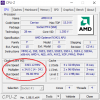Hi all:
I just buy a new HPE GEN 10 Micro Server X3421, the AMD opteron X3421 APU, Speed is from 2.1GHz to 3.4GHz however I noticed the BIOS showing it is running from 1.4GHz to 2.1GHz and currently running at 21Ghz already (a bug and will inform HPE too).
Now when I issue
I get
it is apparently missing the value 3400/xxxx or 2101 so I could not have any benefit to gain.
if I issue
I get
It seems it is running at 1.4GHz only (very unhappy)
So, my question is does it could be hard code the value to /etc/sysctl.conf to include 3400/xxxx or 2101/xxxx ?
BR,
Paul.LKW
I just buy a new HPE GEN 10 Micro Server X3421, the AMD opteron X3421 APU, Speed is from 2.1GHz to 3.4GHz however I noticed the BIOS showing it is running from 1.4GHz to 2.1GHz and currently running at 21Ghz already (a bug and will inform HPE too).
Now when I issue
sysctl hw.cpu.0.freq_levelsI get
Code:
dev.cpu.0.freq_levels: 2100/5036 1800/3650 1400/2428if I issue
sysctl hw.cpu.0.freqI get
Code:
hw.cpu0freq: 1400So, my question is does it could be hard code the value to /etc/sysctl.conf to include 3400/xxxx or 2101/xxxx ?
BR,
Paul.LKW



